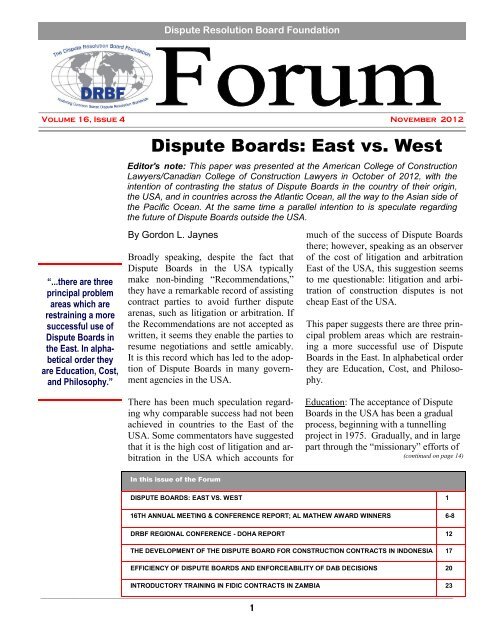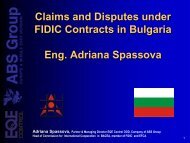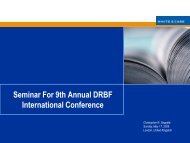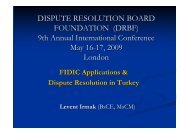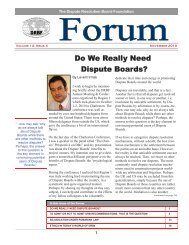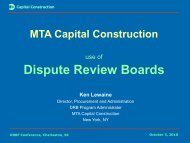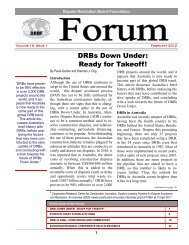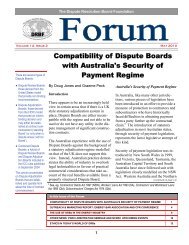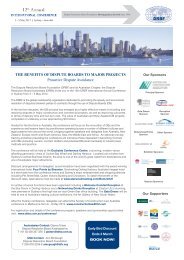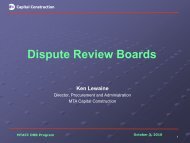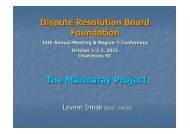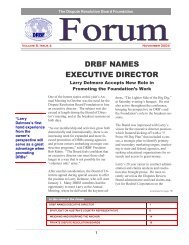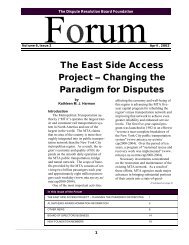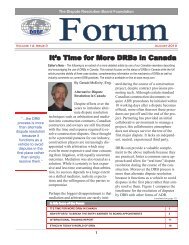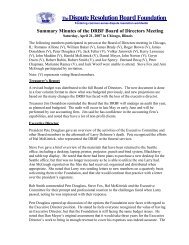Dispute Boards: East vs. West - Dispute Resolution Board Foundation
Dispute Boards: East vs. West - Dispute Resolution Board Foundation
Dispute Boards: East vs. West - Dispute Resolution Board Foundation
Create successful ePaper yourself
Turn your PDF publications into a flip-book with our unique Google optimized e-Paper software.
<strong>Dispute</strong> <strong>Resolution</strong> <strong>Board</strong> <strong>Foundation</strong><br />
Volume 16, Issue 4 November 2012<br />
“...there are three<br />
principal problem<br />
areas which are<br />
restraining a more<br />
successful use of<br />
<strong>Dispute</strong> <strong><strong>Board</strong>s</strong> in<br />
the <strong>East</strong>. In alphabetical<br />
order they<br />
are Education, Cost,<br />
and Philosophy.”<br />
<strong>Dispute</strong> <strong><strong>Board</strong>s</strong>: <strong>East</strong> <strong>vs</strong>. <strong>West</strong><br />
Editor's note: This paper was presented at the American College of Construction<br />
Lawyers/Canadian College of Construction Lawyers in October of 2012, with the<br />
intention of contrasting the status of <strong>Dispute</strong> <strong><strong>Board</strong>s</strong> in the country of their origin,<br />
the USA, and in countries across the Atlantic Ocean, all the way to the Asian side of<br />
the Pacific Ocean. At the same time a parallel intention to is speculate regarding<br />
the future of <strong>Dispute</strong> <strong><strong>Board</strong>s</strong> outside the USA.<br />
By Gordon L. Jaynes<br />
Broadly speaking, despite the fact that<br />
<strong>Dispute</strong> <strong><strong>Board</strong>s</strong> in the USA typically<br />
make non-binding “Recommendations,”<br />
they have a remarkable record of assisting<br />
contract parties to avoid further dispute<br />
arenas, such as litigation or arbitration. If<br />
the Recommendations are not accepted as<br />
written, it seems they enable the parties to<br />
resume negotiations and settle amicably.<br />
It is this record which has led to the adoption<br />
of <strong>Dispute</strong> <strong><strong>Board</strong>s</strong> in many government<br />
agencies in the USA.<br />
much of the success of <strong>Dispute</strong> <strong><strong>Board</strong>s</strong><br />
there; however, speaking as an observer<br />
of the cost of litigation and arbitration<br />
<strong>East</strong> of the USA, this suggestion seems<br />
to me questionable: litigation and arbitration<br />
of construction disputes is not<br />
cheap <strong>East</strong> of the USA.<br />
This paper suggests there are three principal<br />
problem areas which are restraining<br />
a more successful use of <strong>Dispute</strong><br />
<strong><strong>Board</strong>s</strong> in the <strong>East</strong>. In alphabetical order<br />
they are Education, Cost, and Philosophy.<br />
There has been much speculation regarding<br />
why comparable success had not been<br />
achieved in countries to the <strong>East</strong> of the<br />
USA. Some commentators have suggested<br />
that it is the high cost of litigation and arbitration<br />
in the USA which accounts for<br />
Education: The acceptance of <strong>Dispute</strong><br />
<strong><strong>Board</strong>s</strong> in the USA has been a gradual<br />
process, beginning with a tunnelling<br />
project in 1975. Gradually, and in large<br />
part through the “missionary” efforts of<br />
(continued on page 14)<br />
In this issue of the Forum<br />
DISPUTE BOARDS: EAST VS. WEST 1<br />
16TH ANNUAL MEETING & CONFERENCE REPORT; AL MATHEW AWARD WINNERS 6-8<br />
DRBF REGIONAL CONFERENCE - DOHA REPORT 12<br />
THE DEVELOPMENT OF THE DISPUTE BOARD FOR CONSTRUCTION CONTRACTS IN INDONESIA 17<br />
EFFICIENCY OF DISPUTE BOARDS AND ENFORCEABILITY OF DAB DECISIONS 20<br />
INTRODUCTORY TRAINING IN FIDIC CONTRACTS IN ZAMBIA 23<br />
———————————————————————————————————————————————————<br />
1
<strong>Foundation</strong> Forum<br />
President’s Page<br />
Members, Supporters and Friends of the DRBF,<br />
With my first article as President, I was hoping to talk more about the great annual meeting<br />
we had in New York and my memories of a 6 AM walk every morning through Times<br />
Square seeing all the neon lights. Instead, I am going to pass for now and send my, and I<br />
know all of you reading this, our sincere condolences regarding the recent disastrous storms you and the<br />
rest of the <strong>East</strong> coast have recently endured. Our hearts go out to all of you.<br />
The Executive <strong>Board</strong> has set some challenging goals for the coming year and is establishing committees<br />
to accomplish them. They are as follows:<br />
● Increase funding for the DRBF – Standing Committee Chair Doug Holen<br />
● Update the DRBF Manual to include Regions II & III – Standing Committee Chair Dan Meyer<br />
● Adopt specifications, policies and procedures for one-person DRBs – Committee Chair Warren<br />
Bullock<br />
● DRBF's Strategic Planning Committee (formerly the 10 Year Plan) – Standing committee Chair<br />
Harold McKittrick<br />
● Finalize and publish the DRBF adopted Policies and Administrative Procedures Handbook –<br />
Committee Chair Harold McKittrick<br />
● Training for all Regions – Standing committee Chair Kurt Dettman<br />
● Refocus the DRBF vision to dispute avoidance / prevention as number 1 priority over dispute<br />
resolution<br />
● Replacements for Jim Donaldson who is stepping down as DRBF Treasurer and Steve Fox who is<br />
retiring in June, 2014 – Executive <strong>Board</strong> President<br />
● Marketing Committees<br />
Region I – Deborah Mastin<br />
Region II – Paul Taggart<br />
Region III – Doug Jones<br />
As you can see from above, this will be a busy year for the DRBF which means a lot of assistance is<br />
needed from members. All of the committees listed above can use additional help and I urge all of you to<br />
consider assisting wherever you can. We are a non-profit organization and rely heavily on volunteers to<br />
give some of their time to support our efforts. Finding new DRB users, public agencies or private work,<br />
for example, can be done via telephone and computer. Get leads to the committee chairs and they will<br />
arrange for a follow-up one-on-one presentation.<br />
Roger Brown, President<br />
DRBF Executive <strong>Board</strong> of Directors<br />
“An ounce of prevention is worth a pound of cure.”<br />
-Benjamin Franklin<br />
———————————————————————————————————————————————————<br />
2
DISPUTE<br />
RESOLUTION<br />
BOARD FOUNDATION<br />
FOUNDERS<br />
R. M. Matyas<br />
A.A. Mathews<br />
R.J. Smith<br />
P.E. Sperry<br />
DISPUTE<br />
RESOLUTION<br />
BOARD FOUNDATION<br />
CHARTER MEMBERS<br />
Jack Alkire, Esq.<br />
Romano Allione<br />
Rodney D. Aschenbrenner<br />
Balfour Beatty Construction. Inc.<br />
S.H. Bartholomew, Inc.<br />
John Beyer<br />
Roger Brown<br />
William C. Charvat AIA<br />
Frank Coluccio Construction Co.<br />
Dillingham Construction, Inc.<br />
Raymond J. Dodson, Inc.<br />
James P. Donaldson<br />
Peter M. Douglass, Inc.<br />
Paul Eller & Associates<br />
Frontier-Kemper Constructors. Inc.<br />
Steven M. Goldblatt<br />
Granite Construction, Inc.<br />
Guy F. Atkinson Co. of California<br />
Greg M. Harris, Esq.<br />
Paul R. Heather<br />
Impregilo SPA<br />
Gordon L. Jaynes, Esq.<br />
Al Johnson Construction Co.<br />
Keating Associates<br />
Thomas R. Kuesel<br />
Kerry C. Lawrence<br />
Kellogg, LLC<br />
Kiewit Construction Group Inc.<br />
Lemley & Associates, Inc.<br />
Al Mathews Corporation<br />
McNally Tunneling Corporation<br />
Mechanical Contractors Association<br />
of <strong>West</strong>em Washington<br />
Meyer Construction Consulting<br />
Mole Constructors, Inc.<br />
Nadel Associates<br />
Stephen J. Navin<br />
John W. Nichols, P.E.<br />
Parsons Brinckerhoff Quade &<br />
Douglas, Inc.<br />
Pease & Sons<br />
Edward W. Peterson<br />
H. Ray Poulsen Jr.<br />
Quadrant II lnc.<br />
John Reilly Associates<br />
Aurthur B. Rounds<br />
Seifer Yeats & Mills L.L.P.<br />
Shannon & Wilson, Inc.<br />
J.F. Shea Co., Inc.<br />
Patrick A. Sullivan, Esq.<br />
Traylor Brothers, Inc.<br />
Underground Technology Research<br />
Council<br />
Watt, Tieder & Hoffar, L.L.P.<br />
James L. Wilton<br />
Woodward-Clyde Consultants<br />
Ed Zublin AG<br />
<strong>Foundation</strong> Forum<br />
Executive <strong>Board</strong> of Directors<br />
The members of the Executive <strong>Board</strong> of Directors are:<br />
Roger Brown, President<br />
Graham <strong>East</strong>on, President Elect<br />
Volker Jurowich, Immediate Past President<br />
Murray Armes, Secretary<br />
James P. Donaldson, Treasurer<br />
Deborah Mastin, Director and President, Region 1 <strong>Board</strong><br />
Paul Taggart, Director and President, Region 2 <strong>Board</strong><br />
John Norton, Past President<br />
Romano Allione, Past President<br />
James J. Brady, Past President<br />
Peter M. Douglass, Director, Past President<br />
Gwyn Owen, Director, Past President<br />
Joe Sperry, PE, Founder, Honorary Director<br />
The Executive Committee meets monthly. Recent topics have included:<br />
● Appointment of new committees and committee chairs<br />
● Outreach to markets beyond construction<br />
● Creation of DRBF policy with regard to One-Person DRBs<br />
Summaries of the Executive <strong>Board</strong> meetings are available to all DRBF members on<br />
the DRBF web site. To access the <strong>Board</strong> of Directors Meeting Minutes Summary,<br />
go to www.drb.org. Click on the Member Login button, and then click on DRBF<br />
<strong>Board</strong> of Directors.<br />
Executive <strong>Board</strong> of Directors Meeting Schedule:<br />
November 19, 2012 by conference call<br />
December 17, 2012 by conference call<br />
January 21, 2013 by conference call<br />
The <strong><strong>Board</strong>s</strong> of Regions 1 and 2 also meet on a monthly basis. Questions for the<br />
Executive or Regional <strong><strong>Board</strong>s</strong> should be addressed to the <strong>Board</strong> President, care of:<br />
<strong>Dispute</strong> <strong>Resolution</strong> <strong>Board</strong> <strong>Foundation</strong><br />
19550 International Blvd. So., Suite 314, Seattle, WA 98188<br />
Phone: 206-878-3336 Fax: 206-878-3338 Toll free (US only) 888-523-5208<br />
Email: info@drb.org Web: www.drb.org<br />
Region 1<br />
<strong>Board</strong> of Directors<br />
Deborah Mastin, President<br />
Don Henderson, President Elect<br />
Doug Holen, Past President<br />
Kurt Dettman<br />
Eric Kerness<br />
Gerald McEniry<br />
Region 2<br />
<strong>Board</strong> of Directors<br />
Paul Taggart, President<br />
James Perry, President Elect<br />
Richard Appuhn, Past President<br />
Murray Armes<br />
Andrew Griffiths<br />
Christopher Miers<br />
Alina Valentina Oprea<br />
———————————————————————————————————————————————————<br />
3
<strong>Foundation</strong> Forum<br />
Letter to the Editor:<br />
So, Just Whose Process is this Anyway?<br />
To the Forum editor,<br />
One of the threads running through presentations and discussions at the recent Annual<br />
Meeting in NYC was placing greater emphasis on <strong>Dispute</strong>s Avoidance over<br />
<strong>Dispute</strong>s <strong>Resolution</strong> as a principal function of DRBs. During a breakout session<br />
on “Should DRB Decisions be Admissible,” a show of hands was asked for on<br />
whether participants favored the admissibility of DRB decisions in subsequent arbitration/court<br />
proceedings. A notable dissenter among the vast majority favoring<br />
admissibility was Bill Edgerton, a member of the DRBF Practices and Procedures<br />
Manual Committee. Bill was asked for an explanation of his position, in light of<br />
the Manual strongly favoring admissibility (“Experience has shown that<br />
[admissibility] has been a major factor in the effectiveness of DRBs ….Changing<br />
this provision to make DRB [decisions] inadmissible undermines the value of the<br />
entire DRB process.”]. Bill pointed out that he had been the only member of the<br />
Manual Committee to oppose admissibility. Bill said that owners’ attorneys have<br />
told him that when project specifications provide for admissibility, their practice<br />
has been to “lawyer-up” DRB hearings. Bill observed that “lawyering-up” can<br />
have unintended consequences such as intimidating hearing participants and inhibiting<br />
open and candid discussions. Bill added that another result of “lawyeringup”<br />
is the inherent delay in getting to the DRB. Prevailing wisdom is that early<br />
submittal of issues to the DRB is helpful, before the parties’ positions harden to<br />
such an extent that they cannot compromise. Also, to reach agreement, the parties’<br />
mind-set should be focused on how to settle – not how to set up the documentation<br />
to win in a subsequent adjudicative proceeding if the DRB is not successful.<br />
Bill and I then discussed the larger issue of emphasis on dispute avoidance <strong>vs</strong>. dispute<br />
resolution. The unintended consequences of admissibility have a bearing on<br />
this larger issue. Intimidating hearing participants and inhibiting open and candid<br />
discussions can also have an adverse effect on dispute avoidance. To that point,<br />
Bill and I both observed that some Annual Meeting participants exhibited a<br />
“heavy handed” or prescriptive attitude in discussions of how DRBs should handle<br />
particular situations that might arise, e.g. “Do what we say, even if you are not inclined<br />
to do so. We know what’s best for you.”<br />
By way of an example, in relation to a DRB on which I am presently serving, the<br />
project is now winding down, but a fair number of unresolved change orders and<br />
time extension requests remain and the project is progressively falling behind<br />
schedule. The owner and contractor both wish to discontinue the periodic DRB<br />
meetings so that they can concentrate on more pressing matters. The DRB disagrees.<br />
We feel that the pressure of having to face the DRB will incentivize the<br />
parties to resolve outstanding issues more quickly to the overall benefit of the project<br />
and disputes avoidance. But we are of divided opinion on just how hard to<br />
push the issue. While we think we know what’s best, the question remains “So<br />
just whose process is this, anyway?”<br />
Forum Editor:<br />
Ann McGough<br />
Editorial and<br />
subscription address:<br />
<strong>Dispute</strong> <strong>Resolution</strong><br />
<strong>Board</strong> <strong>Foundation</strong>,<br />
19550 International<br />
Blvd. So., Suite 314,<br />
Seattle, WA 98188<br />
Phone: 206-878-3336<br />
Fax: 206-878-3338<br />
Toll free (US only)<br />
888-523-5208<br />
amcgough@drb.org<br />
www.drb.org<br />
The Forum is published<br />
quarterly by the <strong>Dispute</strong><br />
<strong>Resolution</strong> <strong>Board</strong><br />
<strong>Foundation</strong> (DRBF). Any<br />
opinions expressed are<br />
those of the authors and<br />
do not necessarily<br />
represent the opinions<br />
of the DRBF.<br />
The Forum welcomes<br />
articles on all aspects of<br />
<strong>Dispute</strong> <strong>Resolution</strong><br />
<strong><strong>Board</strong>s</strong>, and members<br />
are encouraged to submit<br />
articles or topics to<br />
the DRBF, attn: Editor.<br />
All rights reserved. Any<br />
reproduction or utilization,<br />
except that which<br />
constitutes fair use under<br />
federal copyright<br />
law, is a violation of our<br />
copyrights. Written permission<br />
is needed to<br />
reprint more than 300<br />
words.<br />
Please send change of<br />
address with a copy of a<br />
recent mailing label six<br />
weeks in advance.<br />
Copyright © 2012<br />
<strong>Dispute</strong> <strong>Resolution</strong><br />
<strong>Board</strong> <strong>Foundation</strong><br />
———————————————————————————————————————————————————<br />
4
Major<br />
Membership<br />
Contributors<br />
to the DRBF<br />
Platinum<br />
Impregilo<br />
Leach Group<br />
Gold<br />
Jim Brady<br />
Roger Brown<br />
Fenwick Elliott LLP<br />
Frontier-Kemper<br />
Daniel F. Meyer<br />
Silver<br />
Romano Allione<br />
Barnard Construction<br />
Howard Borlack<br />
Diablo Contractors Inc.<br />
James Donaldson<br />
Peter Douglass<br />
Flatiron Construction Corp.<br />
Guy F. Atkinson<br />
Construction<br />
Hoffman Construction<br />
Jacobs Associates<br />
J.F. Shea Co., Inc.<br />
Volker Jurowich<br />
Kenny Construction<br />
Kiewit<br />
Kerry C. Lawrence<br />
Louis Yves LeBeau<br />
Donald Marston<br />
McCarter & English<br />
Frank McDonough P.E.<br />
Harold McKittrick P.E.<br />
McNally Tunneling<br />
Obayashi<br />
Gwyn Owen<br />
Peckar & Abramson<br />
Pegasus Global Holdings<br />
S.A. Healy<br />
Schiavone Construction<br />
Company, LLC<br />
Robert J. Smith P.E., Esq.<br />
Strabag, Inc.<br />
Techno Engineering<br />
The De Moya Group, Inc.<br />
Watt Tieder Hoffar &<br />
Fitzgerald<br />
Thank you for<br />
your support!<br />
<strong>Foundation</strong> Forum<br />
As <strong>Dispute</strong> Avoidance assumes a greater DRB emphasis, the dilemma of “just<br />
whose process is this” will arise with greater frequency. I am anxious to see further<br />
discussion of this subject.<br />
Robert R. (Bob) Rubin<br />
rrubin@mccarter.com<br />
DRBF Country Representatives<br />
Argentina<br />
Maria Laura Velazco<br />
Australia & New<br />
Zealand<br />
Graeme Maxwell Peck<br />
Austria<br />
Marcus Theil<br />
Belgium<br />
William Buyse<br />
Botswana<br />
Tsepo Letsunyane<br />
Brazil<br />
Gilberto José Vaz<br />
Bulgaria<br />
Adrianna Spassova<br />
Canada<br />
Gerald McEniry<br />
China<br />
Hongwei Zhao<br />
Egypt<br />
Sherif EL-Haggan<br />
Ethiopia<br />
Michael Gunta<br />
France<br />
Marc Frilet<br />
Germany<br />
Helmut Koentges<br />
Iceland<br />
Páll Ólafsson<br />
India<br />
Shri K. Subrahmanian<br />
Indonesia<br />
Sarwono Hardjomuljadi<br />
Ireland<br />
Nael G. Bunni<br />
Italy<br />
Andrea Del Grosso<br />
Japan<br />
Naoki Iguchi<br />
Libya<br />
Emhemmed Ghula<br />
Malaysia<br />
Sundra Rajoo<br />
Mauritius<br />
Kailash Dabeesingh<br />
Mexico<br />
Herfried Wöss<br />
Namibia<br />
Riaan de Witt<br />
Nepal<br />
Sanjeev Kiorala<br />
Netherlands<br />
Lyda Bier<br />
Pakistan<br />
Khalil-Ur-Rehman Khan<br />
Peru<br />
Emanuel Cardenas<br />
Phillippines<br />
Salvador P. Castro, Jr.<br />
Poland<br />
Krzysztof Woznicki<br />
Portugal<br />
Manuel Maria Agria<br />
Qatar<br />
Wayne Clark<br />
Romania<br />
Alina Oprea<br />
Saudi Arabia<br />
Nabil Abbas<br />
Singapore<br />
Christopher Redfearn<br />
Southern Africa<br />
Anton van Langelaar<br />
Spain<br />
Pablo Laorden<br />
Sri Lanka<br />
Tilak Kolonne<br />
Switzerland<br />
Michel Nardin<br />
Thailand<br />
Pratim Ghose<br />
Turkey<br />
Levent Irmak<br />
United Arab Emirates<br />
Andy Hewitt<br />
United Kingdom<br />
Murray Armes<br />
———————————————————————————————————————————————————<br />
5
<strong>Foundation</strong> Forum<br />
DRBF 16th ANNUAL MEETING &<br />
CONFERENCE REPORT<br />
By Eric Kerness, Conference Chair and<br />
Member, DRBF Region 1 <strong>Board</strong> of Directors<br />
New York City rolled out its welcome and red carpet<br />
for the DRBF’s 16th Annual Meeting and Conference.<br />
The conference provided attendees a<br />
unique opportunity to learn about the DRB process<br />
and spent some meaningful time in one of the nation’s<br />
greatest cities.<br />
Preceding the conference, experienced trainers Eric<br />
Kerness and Kurt Dettman presented the Administrative<br />
& Practice workshop to those new to the<br />
process. They also conducted the Advanced/Chair<br />
Workshop which provided practical experience and<br />
the ins and outs of serving as a DRB Chair. In addition,<br />
Region 2 Trainers Murray Armes and Christopher<br />
Miers conducted an informative Introduction<br />
to International <strong>Dispute</strong> <strong>Board</strong> Practice workshop<br />
covering FIDIC forms and ICC <strong>Dispute</strong><br />
<strong>Board</strong> rules.<br />
Prior to the conference participants and guests<br />
were able to attend optional events that included a<br />
tour the World Trade Center Memorial and the<br />
MTA Fulton Street Transit Center project. The<br />
conference kicked off with an informative presentation<br />
by Alan Paskoff, Senior Vice President for<br />
MTA Capital Construction for <strong>East</strong> Side Access<br />
which focused on the MTA’s multi-billion dollar<br />
Capital Construction program. His key note address<br />
was followed by presentations on DRB practice<br />
from Mitch Ball, Virginia Department of<br />
Transportation, Tom Byron, Florida Department of<br />
Transportation and Brad Jones, Ohio Department<br />
of Transportation. A session on expanding the<br />
DRB role beyond transportation and infrastructure<br />
was led by Region 1 <strong>Board</strong> members Kurt Dettman<br />
and Deborah Mastin. To recognize the global<br />
reach of DRBs, Doug Jones provided a presentation<br />
on <strong>Dispute</strong> <strong><strong>Board</strong>s</strong> in Australia.<br />
A highlight of the conference was the outstanding<br />
memorable luncheon address given by Steve Plate,<br />
Director of World Trade Center Construction, who<br />
received a lengthy standing ovation after his presentation<br />
on the World Trade Center Freedom<br />
Tower project which is dedicated to the memory of<br />
the 3,800 who perished on September 11. Afternoon<br />
sessions included an Ethics session conducted<br />
by James Philips and Allen Thompson and Robert<br />
Rubin.<br />
The 16 th conference featured individual “Breakout”<br />
sessions that included Robert Rubin’s session on<br />
“Should DRB Decisions be Admissable? The Role<br />
of Lawyers and Experts,” Deborah Mastin and<br />
Doug Holen’s “How to Obtain a DRB appointment”<br />
and Richard DiFedele’s “Adhering to Contract<br />
Provisions, Accepting and Rejecting a DRB<br />
Decision.” The breakout session enabled participants<br />
to engage in in-depth discussion, and left<br />
DRB leadership with some food for thought on<br />
these topics.<br />
The day concluded with Ralph Ellis’ presentation<br />
on “How to Write an Effective DRB Decision” and<br />
Andrew Thomson’s MTACC presentation on DRB<br />
program on the <strong>East</strong> Side Access project. The evening<br />
featured a World Yacht dinner cruise around<br />
Manhattan Island and the Al Mathews Award presentation<br />
to Jim Brady and Toshihiko Omoto (see<br />
page 7).<br />
The second day of the conference featured presentations<br />
on expanded DRB usage in Canada by<br />
DRBF Country Representative Gerald McEniry<br />
and a mock DRB presentation patterned after a<br />
DRB decision from the Wakota Bridge Project in<br />
Minnesota by Kurt Dettman and Tom Welby. The<br />
formal session conclude with by an examination of<br />
the <strong>Dispute</strong> <strong>Board</strong> program in place for the London<br />
Olympics 2012 presented by Executive <strong>Board</strong> Secretary<br />
and Region 2 <strong>Board</strong> Member Murray Armes.<br />
If you were not able to attend this year’s confer-<br />
———————————————————————————————————————————————————<br />
6
<strong>Foundation</strong> Forum<br />
ence, DRBF members can access the papers and<br />
presentations on the DRBF conference website:<br />
www.drbfconferences.org/newyork.htm.<br />
As usual the conference would not be possible<br />
without the hard work throughout the year of my<br />
planning committee that included Kurt Dettman,<br />
Rich DiFedele, Everett McIndoe, Bob Rubin, Tom<br />
Welby, our DRBF conference professional Ann<br />
McGough, and our Seattle office staff, Steve Fox<br />
and Lori Jenkins. Many thanks to our many sponsors,<br />
and to our fundraising committee chaired by<br />
Hal McKittrick and Pete Douglass.<br />
Plans are currently underway for next year’s Annual<br />
Meeting in Miami, Florida. Mark your calendars<br />
and join us.<br />
Eric Kerness can be reached at<br />
eric@kerness.com<br />
James Brady and Toshihiko Omoto<br />
Receive DRBF’s 2012<br />
Al Mathews Award for Excellence<br />
The <strong>Dispute</strong> <strong>Resolution</strong> <strong>Board</strong> <strong>Foundation</strong> presents the prestigious Al Mathews Award<br />
each year to one or more DRBF members who have given exemplary service in advancing<br />
the use of the <strong>Dispute</strong> <strong>Resolution</strong> <strong>Board</strong> concepts and the DRBF. Nominations are solicited<br />
from the membership and by the president of the Executive <strong>Board</strong> of Directors. The<br />
award is presented at the Gala Dinner hosted in conjunction with the DRBF Annual Meeting<br />
and Conference, held this year in New York.<br />
Congratulations to his year’s recipients: James J. Brady and Toshihiko Omoto.<br />
James (Jim) Brady has been has been proactive in the alternate dispute resolution processes<br />
for over 50 years, first as a contractor, then a consultant and then active in the DRB<br />
process as a member on both DRBs and DABs (domestic and international).<br />
Jim is a Registered Professional Engineer and has<br />
been responsible for many large heavy civil projects (while employed<br />
by S. J. Groves, Gates and Fox, and Morrison Knudson,<br />
and then as President of his own firm, B. U. Corp, since 1988.<br />
Jim is a member of the Moles and played a key role in assisting<br />
the Port Authority of New York and New Jersey in completing a<br />
new underground station and connecting subway tunnels following<br />
the tragic event at the World Trade Center. Jim has served as<br />
member (and sometimes Chair) on over 15 DRBs and DABs<br />
throughout the US and Canada and in China and Africa on projects<br />
totaling over U$1.5 billion. He has contributed widely to the<br />
promotion of the DRB process in the world wide construction industry<br />
and in 2008-2009 served as President of the DRBF. Jim<br />
was unable to attend the awards dinner and his son, Jim Brady<br />
Jr., accepted the award on his behalf.<br />
Volker Jurowich presents the<br />
Al Mathews award and proclamation<br />
to Jim Brady Jr.<br />
———————————————————————————————————————————————————<br />
7
<strong>Foundation</strong> Forum<br />
Dr. Toshihiko Omoto accepts<br />
the Al Mathews Award<br />
Toshihiko Omoto holds a Doctorate in Engineering, as well as a<br />
BSc and MSc in Civil Engineering, from Kyoto University, and an<br />
MSc in Construction Law and Arbitration from King's College, University<br />
of London. He is a Fellow of the Japan Society of Civil Engineers,<br />
and in the United Kingdom he is a Fellow of both the Institution<br />
of Civil Engineers and the Chartered Institute of Arbitrators.<br />
He joined the <strong>Dispute</strong> <strong>Resolution</strong> <strong>Board</strong> <strong>Foundation</strong> in January,<br />
1997, at which time he was responsible for administering dispute<br />
resolution for Taisei Corporation's engineering and construction<br />
contracts outside Japan. After retiring from Taisei Corporation,<br />
he was made a full Professor at Kyoto University, holding a<br />
Chair in Conflict <strong>Resolution</strong>, and during his work as professor he<br />
has promoted the use of <strong>Dispute</strong> <strong><strong>Board</strong>s</strong> and the DRBF. For fourteen<br />
years, until 2012, he served as DRBF Country Representative<br />
for Japan. He is the author of the first book published in<br />
Japan on <strong>Dispute</strong> <strong><strong>Board</strong>s</strong>. Also, he was the first Asian appointed<br />
to the FIDIC President's List of Approved Adjudicators and now serves as one of three<br />
members of FIDIC's Assessment Panel for Adjudicators, which assesses applicants for entry<br />
on that FIDIC President's List.<br />
An outstanding example of his continuous promotion of <strong>Dispute</strong> <strong><strong>Board</strong>s</strong> and our <strong>Foundation</strong><br />
is his leadership in the establishment by the Japan International Cooperation Agency<br />
("JICA") of a program of training on use of <strong>Dispute</strong> <strong><strong>Board</strong>s</strong> for contracts financed by that<br />
agency throughout Southeast Asia, including the training and subsequent assessment of<br />
Asian nationals who wish to serve as <strong>Dispute</strong> <strong>Board</strong> members accredited by the Asian<br />
Member Associations of the International Federation of Consulting Engineers ("FIDIC"). In<br />
this work he has promoted interest in, and membership in, the DRBF, and has involved<br />
DRBF members in the training and assessment.<br />
The distinguished list of past winners of the Al Mathews Award includes:<br />
Al Mathews<br />
Robert Matyas<br />
Robert Smith<br />
Joe Sperry<br />
Jimmy Lairscey<br />
Carlos Ospina<br />
Pete Douglass<br />
Jim Donaldson<br />
Steve Fox<br />
Gordon L. Jaynes<br />
John Nichols<br />
Peter H.J. Chapman<br />
Bill Baker<br />
Romano Allione<br />
Harold V. McKittrick<br />
Jack Feller<br />
Richard Appuhn<br />
Gwyn Owen<br />
Robert Rubin<br />
Graeme M. Peck<br />
———————————————————————————————————————————————————<br />
8
<strong>Foundation</strong> Forum<br />
Welcome to New DRBF Members<br />
MEMBER ADDITIONS JULY - SEPTEMBER 2012<br />
Hiroki Aoki<br />
Nagashima Ohno & Tsunematsu<br />
Tokyo, JAPAN<br />
Richard Kerry<br />
TYPSA<br />
Sofia, BULGARIA<br />
Yvonne Bernard<br />
Yvonne Bernard Management Consultants<br />
Fort Lee, NJ USA<br />
Donald Bounds, Esquire<br />
Donald Bounds LLC<br />
Parker, CO USA<br />
James Brady, Jr.<br />
Avondale Estates, GA USA<br />
Bernardo M. Cremades<br />
B. Cremades y Asociados, S.L.<br />
Madrid, SPAIN<br />
Frank Daams<br />
Flatiron Construction Corporation<br />
Benicia, CA USA<br />
Paul DesRoches<br />
Hydro Quebec<br />
Montreal, QC CANADA<br />
Carlos A. Penate Guzman<br />
CONSULEG<br />
Santa Tecla, La Libertad, EL SALVADOR<br />
Douglas Henderson<br />
Cowansville, QC CANADA<br />
Mark Jones<br />
Mark Jones Consulting Pty Ltd.<br />
South Perth, WA AUSTRALIA<br />
Yutaro Kawabata<br />
Nishimura & Asahi<br />
Tokyo, JAPAN<br />
Christian Landry<br />
Demathieu & Bard Inc.<br />
St-Jerome, QC CANADA<br />
Lucio Matarazzo<br />
Lucio Matarazzo Pty Ltd<br />
Parap, NT AUSTRALIA<br />
Malith Mendis<br />
Nawala, SRI LANKA<br />
Jacopo Monaci Naldini<br />
JMU Law Firm<br />
Florence, ITALY<br />
Henry Nave<br />
HJN Construction Consulting LLC<br />
Golden, CO USA<br />
Carlton G. Opel<br />
Ancon International, LLC<br />
Miami, FL USA<br />
Thierry Re<br />
SENLIO<br />
Saint Savournin, FRANCE<br />
Hironobu Tsukamoto<br />
Nagashima Ohno & Tsunematsu<br />
Tokyo, JAPAN<br />
Know someone interested in<br />
joining the DRBF?<br />
Help us expand by sharing DRBF membership<br />
information with your colleagues.<br />
Complete details can be found on the<br />
DRBF web site (www.drb.org) or contact<br />
the main office for details.<br />
———————————————————————————————————————————————————<br />
9
<strong>Foundation</strong> Forum<br />
Ethics in Today’s World of DRBs:<br />
An owner’s project manager from a completed<br />
project asks a DRB Member for a reference for<br />
a new position with a new contractor<br />
By Jim Phillips Ph. D.<br />
The question posed at the end of the last column<br />
was how should you, as a former DRB member on<br />
a project which has been completed, handle being<br />
asked by the owner’s Project Manager for a job<br />
reference for a new position with a private contractor.<br />
This issue at first does not look too complicated.<br />
I first thought that there would be no ethical<br />
problem in providing the requested reference.<br />
However, the more I considered it, the more a<br />
number of red flags went up. How would one reconcile<br />
the role of a neutral party with becoming an<br />
advocate for one of the party’s employees or consultants?<br />
Also, what would I tell the prospective<br />
new employer? My observations of the Project<br />
Manager were limited to regular DRB meetings<br />
and Formal Hearings. What should I say about<br />
those roles? Most importantly, how would providing<br />
a reference impact my neutrality as DRB member<br />
in the industry, and would I be seen as an<br />
“owner’s advocate “or “owner friendly”?<br />
The issues of a DRB member’s links with either<br />
owners or contractors and how perceptions are fueled<br />
and how they impact a DRB member’s appearance<br />
of neutrality are important ones. I know<br />
quite a few <strong>Foundation</strong> members sit on many<br />
<strong><strong>Board</strong>s</strong> for either the same owner or the same contractor.<br />
This, on its face, is perfectly proper, but<br />
could lead to a perception that the individual is an<br />
“owner” member or a “contractor” member.<br />
tinue? Another question is: does providing a refer-<br />
———————————————————————————————————————————————————<br />
10<br />
ence show partiality to either an owner or contractor?<br />
If it does, could it not be cured by disclosing it<br />
the next time this member is being considered for a<br />
DRB on a project where one of the parties is the<br />
potential new employer?<br />
This brings me to a discussion of another Canon of<br />
Ethics, Canon 2. Canon 2 provides that the conduct<br />
of <strong>Board</strong> members should be above reproach and<br />
that even an appearance of a conflict of interest<br />
should be avoided. Usually we think of conflicts of<br />
interest as financial interests or stakes that would<br />
have an impact on a DRB member’s neutrality.<br />
Does a reference letter or telephone call rise to this<br />
level? I do not think so unless for some reason the<br />
Project Manager in our case has promised some<br />
type of favor in return. Obviously, business people<br />
provide each other references and referrals all of<br />
the time without any expectation of a quid pro quo.<br />
I think you can argue this question either way. The<br />
project is completed and there is no duty of neutrality<br />
to either of the parties. A reference letter is<br />
not a financial interest. A reference letter, however,<br />
if it is part of a larger pattern of conduct which creates<br />
an appearance of being an “owner’s advocate”<br />
or being biased toward owners, and could create an<br />
appearance that this <strong>Board</strong> member is going to favor<br />
an owner on a project.<br />
That is the interesting aspect of appearances. They<br />
are in the minds of the observers and two people<br />
can have totally different reactions to the same actions<br />
of someone. As I indicated, if this letter of<br />
reference was a part of a larger pattern that leads to<br />
this <strong>Board</strong> member having a reputation as being<br />
partial to owners, then it can be a problem. The<br />
next time this DRB member is being considered<br />
for a DRB, this may come out and have an impact<br />
on whether he or she is accepted.<br />
A cornerstone of the DRBF’s Canons of Ethics<br />
found in Canon 1 is that a DRB member should be<br />
at all times during the life of the project a neutral<br />
party and avoid the “appearance of partiality” to<br />
one of the parties on the project. The question becomes:<br />
after a project is over, does this duty con-
<strong>Foundation</strong> Forum<br />
I would be interested in hearing from a reader on<br />
this question. This is a good example of a “sticky<br />
wicket” that does not fit into a neat category that<br />
can easily be analyzed and answered. This situation<br />
might be one where the <strong>Board</strong> member could telephone<br />
or email a colleague and ask for advice on<br />
how to best respond to such a request. I have sat on<br />
<strong><strong>Board</strong>s</strong> where we counseled each other in many<br />
areas even after a project was completed. This has<br />
been extremely helpful and an effective way to<br />
reach a good decision on a number of questions.<br />
This raises the purpose for this column and the<br />
DRBF’s commitment to providing a forum for discussions<br />
about ethical issues that we all come into<br />
contact with from time to time. I would encourage<br />
all readers who are faced with an ethical challenge<br />
to take advantage of the opportunity of contacting<br />
experienced colleagues or to write in or call me<br />
with a question. The <strong>Foundation</strong> has established a<br />
protocol whereby we can confidentially discuss an<br />
ethical dilemma that is posed and provide a consensus-based<br />
answer to those in this business who<br />
might need some advice. The DRBF's commitment<br />
to providing an opportunity for discussion of ethical<br />
challenges is a large component of the organization's<br />
mission to ensure that the DRB and other<br />
similar processes are delivered at the highest level<br />
of professional integrity and ethical conduct.<br />
NEXT ETHICS CHALLENGE<br />
Assume you are the Chair of a DRB and that the<br />
contractor, in its presentation to the <strong>Board</strong> of a dispute<br />
in a formal hearing; presented a very detailed<br />
analysis and argument to support its position which<br />
was produced by a claims consultant. During the<br />
hearing, it came to light that the claims consultant<br />
had never been to the site, had no direct knowledge<br />
of the factual circumstances and that his analysis<br />
was carried out three months after the events. The<br />
owner strenuously argues that the analysis and presentation<br />
should not be allowed or admitted because<br />
it was not a ‘contemporary record” and that it should<br />
not be taken into account by the <strong>Board</strong>’s decision.<br />
You have found that the analysis was well produced,<br />
relevant and supported by the contractor’s project<br />
records.<br />
What should the <strong>Board</strong> do?<br />
Ethics Commentary or Question?<br />
Please contact:<br />
Jim Phillips<br />
DRBF Ethics Committee Chair<br />
P: 804-289-8192<br />
E: jphillip@richmond.edu<br />
Forum Newsletter<br />
Editorial Deadline<br />
Our readers love to hear DRB success stories, challenges facing the process, and the latest<br />
industry news and events. If you have new information about DRBs, DRBF members, or an<br />
article to share, please tell us!<br />
Contact Forum Editor Ann McGough by email at amcgough@drb.org.<br />
Deadline for the February issue is<br />
January 1, 2013<br />
———————————————————————————————————————————————————<br />
11
By Wayne Clark<br />
The first DRBF conference to be held in the State<br />
of Qatar took place in Doha on 6 th and 7 th November<br />
2012. Qatar’s success in its bid to host the 2022<br />
FIFA World Cup will bring about a surge of construction<br />
projects, and with it the potential for a<br />
significant rise in the number of disputes. Construction<br />
disputes in Qatar have, in recent years,<br />
given rise to contracting Parties doing battle in the<br />
courts (or in arbitration) and their projects suffering<br />
as a result, particularly in respect of costs and<br />
excessive delays. Qatar’s successful World Cup<br />
bid has changed the dynamics for its construction<br />
programme. This dynamic is time. The projects<br />
that need to be in place for the World Cup cannot<br />
be late. One of the core reasons for projects in the<br />
region experiencing delays has been the lack of a<br />
sensible dispute resolution structure in contracts.<br />
<strong>Dispute</strong> <strong><strong>Board</strong>s</strong> is the only dispute management<br />
process that, if applied correctly, can actually prevent<br />
disputes in the construction projects and the<br />
prevention (or early resolution) of disputes can<br />
contribute significantly to major construction projects<br />
being delivered on time. With the Qatar 2022<br />
FIFA World Cup in mind, the theme for this Regional<br />
Conference focused on the role of <strong>Dispute</strong><br />
<strong><strong>Board</strong>s</strong> in the prevention and early resolution of<br />
construction disputes.<br />
The conference kicked off on with an Introduction<br />
to the <strong>Dispute</strong> <strong>Board</strong> Process chaired by Christopher<br />
Miers with presentations by Laura Warren<br />
and Giovanni di Falco. In this session Laura explained<br />
the dispute resolution forum ‘climate’ in<br />
Qatar, which primarily centres around the court<br />
system and the difficulties such a process can be, in<br />
particular for international construction companies.<br />
Giovanni highlighted the advantages of using <strong>Dispute</strong><br />
<strong><strong>Board</strong>s</strong> in construction projects, the positive<br />
effect of <strong>Dispute</strong> <strong><strong>Board</strong>s</strong> on tendering and tender<br />
prices and the fact that contractors are very much<br />
in favour of the <strong>Dispute</strong> <strong>Board</strong> mechanism.<br />
<strong>Foundation</strong> Forum<br />
DRBF REGIONAL CONFERENCE – DOHA<br />
Effective Use of <strong>Dispute</strong> <strong><strong>Board</strong>s</strong> for <strong>Dispute</strong> Avoidance<br />
and <strong>Resolution</strong> on Major Projects<br />
The main theme of the conference was then taken<br />
up in the session on <strong>Dispute</strong> Avoidance: A Unique<br />
Benefit to <strong>Dispute</strong> <strong><strong>Board</strong>s</strong>, chaired by Murray<br />
Armes. Speakers Mark Hoyle and Aisha Nadar<br />
examined the techniques that can be applied by and<br />
challenges facing standing <strong>Dispute</strong> <strong>Board</strong> members<br />
in their quest to help parties find solutions to differences<br />
before they develop into full-blown disputes,<br />
especially in a multi-cultural environment<br />
such as the Gulf and MENA regions. The application<br />
of mediation techniques and effective communication,<br />
in particular cross-culture communication,<br />
if applied skillfully, can be most effective in<br />
dispute avoidance.<br />
The first day’s sessions closed with presentations<br />
on the Roles of the Parties given by Ehmemmed<br />
Ghula, Nabeel Khokhar and Simon Delves under<br />
the chairmanship of Paul Taggart. This session<br />
also included a role-play mock DB Hearing, which<br />
was well received by most participants. During the<br />
afternoon, the delegates were treated to a tour of<br />
several major developments underway in Doha and<br />
visited two of Doha’s most prestigious projects the<br />
Pearl and Lusail City Development where representatives<br />
explained the intricacies of the developments<br />
with the aid of impressive project models.<br />
The day ended rather fittingly with a well-attended<br />
Gala Dinner situated in the hotel gardens alongside<br />
the sea and overlooking Doha’s impressive downtown<br />
(<strong>West</strong> Bay) skyline.<br />
The final day of the conference began with a Keynote<br />
Address Knowledge is a Treasure, but Practice<br />
is the Key to it delivered by Dr Minas<br />
Khatchadourian the CEO and Secretary General<br />
of the Qatar International Centre for Conciliation<br />
and Arbitration. Dr Minas stated that from his observations,<br />
parties to construction contracts in the<br />
region, particularly Employers (thanks to a large<br />
extent to the use of FIDIC forms of contract), are<br />
realizing the importance of <strong>Dispute</strong> <strong><strong>Board</strong>s</strong> who,<br />
when pro-active, can help prevent disputes in our<br />
industry. Dr Minas believes there is a real opportu-<br />
———————————————————————————————————————————————————<br />
12
nity for DBs to flourish in the coming years and if<br />
handled by real experts, he is convinced of the success<br />
of <strong>Dispute</strong> <strong><strong>Board</strong>s</strong> in preventing unnecessary<br />
cost and delays.<br />
A two-hour panel discussion then followed in<br />
which various aspects of the use (or otherwise) of<br />
<strong>Dispute</strong> <strong><strong>Board</strong>s</strong> in the Gulf Region were discussed.<br />
Chaired by Wayne Clark, the panel of experts,<br />
who represented six of the Gulf/MENA<br />
countries, was asked to share their experiences and<br />
views on the use of <strong>Dispute</strong> <strong><strong>Board</strong>s</strong> in their respective<br />
countries. The panel members were Dr Sherif<br />
El-Haggan (Egypt), Dr Nabil Abbas (Kingdom of<br />
Saudi Arabia), Andy Hewitt (United Arab Emirates),<br />
Jamie Kallick (Oman and Bahrain) and<br />
Oliver Alexander (State of Qatar). A range of topics<br />
and questions were offered to panel members<br />
and delegates, who all actively participated in what<br />
transpired to be a lively and stimulating debate.<br />
The final session before lunch, chaired by David<br />
Savage, was appropriately entitled Compare and<br />
Contrast: <strong>Dispute</strong> <strong><strong>Board</strong>s</strong> under Civil and<br />
Sharia’a Law. Thought provoking presentations<br />
were given by Dr Minas Khatchadourian,<br />
Yasemin Cetinel and Dr Sherif El-Haggan. Dr<br />
Sherif explained how under Islamic or Sharia’a law<br />
settlement of disputes is not merely encouraged,<br />
but mandatory and that the settlement of disputes is<br />
one of the richest areas of Islamic Law. Dr Minas<br />
provided an interesting comparative table in which<br />
he compared conflict and conflict resolution approaches<br />
and how they differ under <strong>West</strong>ern and<br />
Middle-eastern cultures. Yasemin explained some<br />
aspects of Turkish law and how disputes are dealt<br />
with in Turkey and that in many contracts, <strong>Dispute</strong><br />
<strong>Board</strong> provisions are deleted.<br />
In the afternoon Nicholas Gould presented Five<br />
Steps for a Successful <strong>Dispute</strong> <strong>Board</strong> Process.<br />
Nicholas provided some very useful and practical<br />
guidelines for <strong>Dispute</strong> <strong>Board</strong> members and construction<br />
managers alike. These included the basic<br />
principles of sound technical management, good<br />
communication and understanding/using the contract.<br />
Nicholas’ five steps for success are (i) setting<br />
up the project, (ii) running the project, (iii) managing<br />
change, (iv) dispute avoidance, and (v) dispute<br />
management. Execute these steps well and wisely<br />
<strong>Foundation</strong> Forum<br />
and the project will succeed.<br />
Murray Armes chaired the next two sessions with<br />
presentations by Marc Bryant on Avoiding Acrimony:<br />
<strong>Dispute</strong> Avoidance from the Client’s Perspective<br />
and Ismail Essa on <strong>Dispute</strong> <strong>Board</strong> Process<br />
for Complex Projects: World Cup in South<br />
Africa. Marc took the delegates through the dispute<br />
resolution procedure adopted for some of the London<br />
Olympic Games projects, such as an Independent<br />
<strong>Dispute</strong> Avoidance Panel, which appeared to<br />
have been successful. From the statistics provided<br />
by Marc, there have been no acrimonious court<br />
battles and only two adjudications, one of which<br />
was suspended. Ismail provided some encouraging<br />
data from some of the major infrastructure projects<br />
undertaken in preparation for the FIFA World Cup<br />
hosted by South Africa. Of the 18 projects cited by<br />
Ismail as having <strong>Dispute</strong> <strong><strong>Board</strong>s</strong>, on only one project<br />
was there a significant number of disputes referred<br />
to the DAB for a decision. It appears that the<br />
<strong>Dispute</strong> <strong>Board</strong> avoidance techniques were highly<br />
successful in sunny South Africa.<br />
In the final session, Dr Imad Al Jamal gave a<br />
forceful presentation on <strong>Dispute</strong> <strong><strong>Board</strong>s</strong> in the<br />
Gulf Region in which he focused on his home territory,<br />
the United Arab Emirates. Dr Jamal believes<br />
that while there is still some skepticism and reluctance<br />
to the use of <strong>Dispute</strong> <strong><strong>Board</strong>s</strong>, DBs are here<br />
(to stay) and employers, engineers and consultants<br />
need to be made aware of how effective <strong>Dispute</strong><br />
<strong><strong>Board</strong>s</strong> are. In all, over 50 delegates and speakers<br />
attended this Regional Conference, representing<br />
eighteen countries, twelve of which were outside<br />
the Gulf/MENA Region. Based on the feedback<br />
received from the delegates, the vast majority<br />
found the conference rewarding and informative.<br />
While it is evident to those of us based in the region<br />
that <strong>Dispute</strong> <strong><strong>Board</strong>s</strong> are not widely used in<br />
construction projects, what is encouraging, at least<br />
for the State of Qatar, is that one of the major government<br />
employers that has been vigorously resisting<br />
the use of <strong>Dispute</strong> <strong><strong>Board</strong>s</strong>, is now seriously<br />
considering revising its policy and including <strong>Dispute</strong><br />
<strong><strong>Board</strong>s</strong> in its future construction contracts.<br />
Wayne Clark can be reached at<br />
wayneclark@hillintl.com<br />
———————————————————————————————————————————————————<br />
13
<strong>Foundation</strong> Forum<br />
(continued from page 1)<br />
the <strong>Dispute</strong> <strong>Resolution</strong> <strong>Board</strong> <strong>Foundation</strong>, it has<br />
come to be widely used, especially by Departments<br />
of Transportation of the various states. That educational<br />
process has extended over almost four decades<br />
and continues today, fostered by the DRBF<br />
and its public conferences and workshops, as well<br />
as “in house” training programs for <strong>Dispute</strong> <strong>Board</strong><br />
users.<br />
By comparison, use of <strong>Dispute</strong> <strong><strong>Board</strong>s</strong> in the <strong>East</strong><br />
is new. The first use of a <strong>Dispute</strong> <strong>Board</strong> outside the<br />
USA was the El Cajon Hydropower Project in<br />
Honduras in 1981. The use was successful and no<br />
disputes went to arbitration or litigation. Yet it was<br />
not until 1995 that The World Bank (which had<br />
financed the El Cajon project) introduced the <strong>Dispute</strong><br />
<strong>Board</strong> to its Standard Bidding Document,<br />
“Procurement of Works”, for use on construction<br />
contracts in which the design is performed by others.<br />
That same year, FIDIC introduced its form of<br />
<strong>Dispute</strong> <strong>Board</strong> in its Conditions for Design-Build<br />
and Turnkey Contracts. Thus, some 14 years had<br />
elapsed between initial successful use and wider<br />
use. Use by other Multilateral Development Banks<br />
was sporadic and it was not until 2005 that widespread<br />
use by these banks began, with the adoption<br />
of the FIDIC MDB Harmonised Edition of the<br />
Conditions for Construction. This “harmonisation”<br />
of the procurement practices of the MDBs was an<br />
outgrowth of the United Nations’ Millennium Development<br />
Goals.<br />
Comparing <strong>West</strong> and <strong>East</strong> the lengths of educational<br />
efforts have been some four decades <strong>vs</strong>. 1.5<br />
decades. Also, during the comparatively short time<br />
that educational efforts have progressed in the <strong>East</strong>,<br />
those efforts have been focused almost exclusively<br />
on the FIDIC version of the <strong>Dispute</strong> <strong>Board</strong>, the<br />
“<strong>Dispute</strong> Adjudication <strong>Board</strong>”, which has as a distinguishing<br />
feature the <strong>Board</strong>’s ability to make<br />
contractually binding decisions, subject only to resorting<br />
to international commercial arbitration. Of<br />
that, more later.<br />
During the seven years since the Multilateral Development<br />
Banks began use of the Harmonised<br />
Conditions, and until very recently, no organised<br />
training of bank staff and borrower staff has appeared,<br />
despite the fact that in many developing<br />
countries the FIDIC Conditions and the role of <strong>Dispute</strong><br />
<strong><strong>Board</strong>s</strong> were practically unknown. This lack<br />
of education has led to misuse, and the appearance<br />
of many dysfunctional <strong>Dispute</strong> <strong><strong>Board</strong>s</strong>.<br />
Cost: In the <strong>West</strong>, <strong>Dispute</strong> <strong>Board</strong> members are paid<br />
for the time worked. In the <strong>East</strong>, under the model<br />
developed by The World Bank, each <strong>Dispute</strong><br />
<strong>Board</strong> Member is paid two types of fee: a monthly<br />
retainer fee and a daily fee. The retainer fee is for<br />
availability to come to the project site on other than<br />
regularly scheduled visits, for becoming acquainted<br />
with the contract and remaining acquainted with its<br />
development and maintaining relevant office files,<br />
and for other work not covered by the daily fee.<br />
The daily fee is for travel to and from the site, for<br />
the duration of site visits, for time spent in hearings<br />
not held during regular site visits, study of documents<br />
submitted regarding disputes, private conferring<br />
by the <strong>Board</strong> members, and preparation of its<br />
decisions.<br />
Initially, The World Bank’s <strong>Dispute</strong> <strong>Board</strong> provisions<br />
set the monthly retainer at three times the<br />
daily fee, and the daily fee was set as the equivalent<br />
of the daily fee for an arbitrator under the UN’s International<br />
Center for Settlement of Investment <strong>Dispute</strong>s<br />
(“ICSID”), unless the contract parties agreed a<br />
different daily fee. FIDIC did not set any benchmark<br />
fee rates, but adopted the two fees approach,<br />
as did (later) the ICC <strong>Dispute</strong> <strong>Board</strong> Rules. The IC-<br />
SID daily fee for its arbitrators has risen to a current<br />
rate of USD 3,000. If one applies this to a three<br />
person <strong>Dispute</strong> <strong>Board</strong> on a project of three-years<br />
duration, with regularly scheduled site visits quarterly,<br />
the cost exceeds USD 1 million even if there<br />
are no disputes requiring hearings outside regularly<br />
scheduled site visits.<br />
That USD 1 million number also excludes significant<br />
expenses of the <strong>Dispute</strong> <strong>Board</strong> such as airfares<br />
and hotel accommodations. Such expenses become<br />
significant because typically <strong>Dispute</strong> <strong>Board</strong> members<br />
have come predominantly from developed<br />
countries, travelling significant distances to serve.<br />
———————————————————————————————————————————————————<br />
14
Paradoxically, the Multilateral Development Banks<br />
that require the use of <strong>Dispute</strong> <strong><strong>Board</strong>s</strong> have not developed<br />
a consistent policy of extending their financing<br />
of the contract to the cost of the <strong>Dispute</strong><br />
<strong>Board</strong>, or even the foreign currency cost of a <strong>Dispute</strong><br />
<strong>Board</strong>. The European Union is still pursuing a<br />
policy toward <strong>Dispute</strong> <strong><strong>Board</strong>s</strong> that regards them as a<br />
form of litigation and thus ineligible for financing<br />
by the E.U.<br />
The result has been that especially in developing<br />
countries, the Employers/Owners have sought to<br />
avoid or reduce the cost of the <strong><strong>Board</strong>s</strong>. In some contracts,<br />
despite the requirement for the use of <strong>Dispute</strong><br />
<strong>Board</strong> the parties have not established a <strong>Board</strong>. In<br />
other contracts cost reduction efforts have led, in<br />
too many cases, to dysfunctional <strong>Dispute</strong> <strong><strong>Board</strong>s</strong>.<br />
Examples? Ignoring the contract provisions and<br />
postponing the establishment of the <strong>Board</strong> until after<br />
a dispute has arisen which the parties are unable<br />
to resolve by discussion and negotiation; restricting<br />
regularly scheduled site visits to once a year, using<br />
a single <strong>Board</strong> on multiple concurrent contracts at<br />
different sites.<br />
Philosophy: In many countries, there is a resistance<br />
to the FIDIC philosophy that the decision of its <strong>Dispute</strong><br />
Adjudication <strong>Board</strong> must be immediately binding<br />
on the contract parties, who must implement it<br />
forthwith even if one (or both) parties have given<br />
Notice of Dissatisfaction and intention to refer the<br />
dispute to arbitration. The background to the FIDIC<br />
philosophy can be found in the history of its first<br />
and still predominant set of Conditions of Contract,<br />
the Red Book, for use in construction where the<br />
works are designed by other than the contractor.<br />
Until the 4 th Edition, disputes were decided by the<br />
Engineer, and the decisions of the Engineer could<br />
not be referred to arbitration until after completion<br />
of the contract Works. Although the 4 th Edition,<br />
first published in 1987, introduced the ability of a<br />
party to initiate arbitration during construction, the<br />
Engineer’s decision still was binding and both parties<br />
were contractually bound to abide by it unless<br />
and until it was altered in arbitration. In 1996,<br />
when the supplement to the 4 th Edition appeared,<br />
introducing the <strong>Dispute</strong> Adjudication <strong>Board</strong> as an<br />
<strong>Foundation</strong> Forum<br />
alternative decider of disputes under the Red Book,<br />
the decision of the <strong>Board</strong> was given the same contractually<br />
binding status as the decision of the Engineer.<br />
The rationale behind this philosophy is that<br />
the progress of construction must be paramount and<br />
thus the parties must follow the decision of the Engineer<br />
or the DAB, even if that decision is later altered<br />
in arbitration.<br />
This philosophy has met with resistance in many<br />
countries. Employers facing a decision requiring<br />
payment of a large sum of money have simply refused<br />
to comply unless and until a final award is<br />
issued by an arbitral tribunal. Efforts have been<br />
made to obtain court injunctions to force compliance<br />
with a DAB decision, or to obtain an interim<br />
arbitral award requiring compliance prior to final<br />
award, only to discover that under the applicable<br />
law, no such temporary or interim enforcement of<br />
the DAB decision can be obtained so long as ultimate<br />
validity of the DAB decision is subject to a<br />
final award of the arbitral tribunal, or a final decision<br />
of a court of law.<br />
However this overview of <strong>Dispute</strong> <strong>Board</strong> problems<br />
in the <strong>East</strong> would be misleading if it did not mention<br />
hopeful efforts which are afoot to overcome the<br />
challenges of Education, Cost, and Philosophy.<br />
Education: The Japan International Cooperation<br />
Agency (“JICA”) has become a leader among the<br />
development lenders in two respects. First, it is<br />
adopting a consistent policy of treating the cost of<br />
<strong>Dispute</strong> <strong><strong>Board</strong>s</strong> as eligible for financing by JICA.<br />
Second, it is financing and executing a training program<br />
for effective use of <strong>Dispute</strong> <strong><strong>Board</strong>s</strong> in those<br />
Southeast Asian countries in which it is most active.<br />
This training program is being developed in collaboration<br />
with the national Member Associations<br />
of FIDIC, and the <strong>Dispute</strong> <strong>Resolution</strong> <strong>Board</strong> <strong>Foundation</strong>.<br />
In-country training programs are operated<br />
to educate users on the FIDIC MDB Harmonised<br />
Conditions for Construction which are being<br />
adopted by JICA for use on contracts it finances.<br />
Also, additional in-country training workshops are<br />
being conducted for persons who wish to serve on<br />
<strong>Dispute</strong> <strong><strong>Board</strong>s</strong>, followed by evaluation workshops,<br />
leading to identification of persons recommended<br />
———————————————————————————————————————————————————<br />
15
<strong>Foundation</strong> Forum<br />
for listing by the local Member Association of<br />
FIDIC as approved candidates for appointment to<br />
<strong>Dispute</strong> <strong><strong>Board</strong>s</strong>. JICA has developed the interest of<br />
the Asian Development Bank, and more recently,<br />
The World Bank in establishing similar training<br />
programs in other countries. These programs not<br />
only help in effective use of <strong>Dispute</strong> <strong><strong>Board</strong>s</strong> but<br />
also enable creation of <strong><strong>Board</strong>s</strong> using in-country<br />
members, thus reducing reliance on foreign members<br />
and reducing the cost of <strong>Dispute</strong> <strong><strong>Board</strong>s</strong>.<br />
Costs: Another cost reduction effort, initiated by<br />
members of the <strong>Dispute</strong> <strong>Resolution</strong> <strong>Board</strong> <strong>Foundation</strong>,<br />
is the elimination of the use of monthly retainer<br />
fees, and arranging the daily fee for <strong>Dispute</strong><br />
<strong>Board</strong> Members to be at a reasonable rate and to be<br />
paid for all work done while serving as a <strong>Dispute</strong><br />
<strong>Board</strong> Member. There is convincing evidence that<br />
the elimination of the monthly retainer fee will not<br />
reduce the availability of sufficient and suitable experienced<br />
persons to serve on the <strong><strong>Board</strong>s</strong>. The<br />
elimination of monthly retainers has been proposed<br />
to the Task Force currently reviewing possible revisions<br />
to the <strong>Dispute</strong> <strong>Board</strong> Rules of the International<br />
Chamber of Commerce.<br />
Philosophy: An <strong>East</strong>ern expression comes to mind:<br />
When facing a strong wind, one should bend with<br />
the wise bamboo. In those circumstances where it<br />
is difficult or impossible to establish <strong>Dispute</strong><br />
<strong><strong>Board</strong>s</strong> which issue contractually binding decisions<br />
that are effective, let’s try <strong>Dispute</strong> <strong><strong>Board</strong>s</strong> that make<br />
non-binding Recommendations. Such <strong><strong>Board</strong>s</strong> have<br />
equal capacity to assist the parties in resolving disagreements<br />
before they become formal disputes. In<br />
other words, they can offer dispute prevention services.<br />
Further, and as in the <strong>West</strong>, even if both parties<br />
do not agree with a particular Recommendation,<br />
that Recommendation often will open the way for<br />
the parties to resume negotiations and find an amicable<br />
resolution to the problem without resort to<br />
arbitration or litigation.<br />
Such an alternative can be made available under the<br />
ICC <strong>Dispute</strong> <strong>Board</strong> Rules with a very small change<br />
to the “<strong>Dispute</strong> Review <strong>Board</strong>” or “DRB” existing<br />
under the present rules. Such change has been proposed<br />
already to the Task Force reviewing those<br />
rules.<br />
And what of FIDIC? The suggestion is that it is<br />
time to provide users an option which allows the<br />
user to choose either a <strong>Dispute</strong> <strong>Board</strong> which makes<br />
a contractually binding decision or a <strong>Dispute</strong> <strong>Board</strong><br />
which makes a non-binding Recommendation.<br />
Also, FIDIC should assure that each type of <strong>Dispute</strong><br />
<strong>Board</strong> is established at the commencement of the<br />
contract, so that the <strong>Board</strong> can perform its principal<br />
purpose of dispute prevention. The concept of an<br />
ad hoc <strong>Dispute</strong> <strong>Board</strong>, created only if and when a<br />
dispute has arisen which the parties are unable to<br />
settle by negotiations has proven to be problematic,<br />
primarily because its nature prevents it from performing<br />
the primary role of a <strong>Dispute</strong> <strong>Board</strong> – the<br />
prevention of formal disputes.<br />
Gordon L. Jaynes can be reached by email<br />
at Glj4law@aol.com.<br />
DRBF PROJECT DATABASE SURVEY<br />
The DRBF gathers information on projects using a <strong>Dispute</strong> <strong>Board</strong> to monitor use and share<br />
basic information for educational purposes.<br />
If you are serving on a <strong>Board</strong> or know of a project with a DB, please take a few minutes to<br />
submit the details by email to the DRBF office (info@drb.org) or complete our online survey.<br />
The online version can be found under the “Publications & Data” tab on the DRBF website<br />
(www.drb.org); select “Database” and then “Survey Form.”<br />
———————————————————————————————————————————————————<br />
16
<strong>Foundation</strong> Forum<br />
The Development of the <strong>Dispute</strong> <strong>Board</strong> for<br />
Construction Contracts in Indonesia<br />
By Dr.Sarwono Hardjomuljadi<br />
DRBF Country Representative for<br />
Indonesia<br />
The first construction project using<br />
the DAB under FIDIC Conditions<br />
of Contract for Construction, Edition<br />
1999 within the state-owned<br />
companies in Indonesia was a gas pipelaying project<br />
(2008) owned by PT Perusahaan Gas Negara<br />
(State Owned Gas Utility Company).<br />
Originally, Peter Chapman, Toshihiko Omoto and<br />
I were requested by the parties to be the <strong>Dispute</strong><br />
<strong>Board</strong> for one of their projects, but they changed<br />
their opinion to use the single DB instead of a<br />
three member DB because of some reasons<br />
(FIDIC GCC for Construction 1999, Clause 20.2<br />
Appointment of the <strong>Dispute</strong> Adjudication <strong>Board</strong>,<br />
para 2 mentions that the use of either one or three<br />
DB is allowed).<br />
One experience of the use of <strong>Dispute</strong> <strong><strong>Board</strong>s</strong> in<br />
Indonesia is the application problem of DB decision<br />
(FIDIC GCC for Construction Clause 20.4<br />
para 4 “………The decision shall be binding on<br />
both parties, who shall promptly give effect to<br />
it…….”). The contractor asked the employer to<br />
“immediately” pay their liability to the contractor,<br />
but the employer refused to do so. The employer<br />
was reluctant to pay because the contractor would<br />
not easily return the money back if the future arbitration<br />
decided the contrary.<br />
Based on several experiences, I am of the opinion<br />
that having three DB members is recommended as<br />
it is much better than the single DB. Using a single<br />
DB may raise many problems, from the<br />
lengthy appointment process until the arguable<br />
decision.<br />
The problems incurred on that project made me<br />
reach out Professor Toshihiko Omoto from Japan,<br />
who was at that time the Country Representative<br />
for Japan.<br />
We are of the same opinion that the most important<br />
thing is to educate the “decision makers”<br />
with the proper understanding of the DB implementation<br />
process.<br />
We successfully hosted a <strong>Dispute</strong> <strong>Board</strong> Seminar,<br />
supported by JICA and opened by HE Minister of<br />
Public Works of Indonesia, Dr. Djoko Kirmanto,<br />
on May 14, 2012 in Indonesia, with Toshihiko<br />
Omoto and Sebastian Hoek as the speakers. Dr.<br />
Djoko Kirmanto as the Minister of Public Works<br />
of Indonesia is the responsible decision maker for<br />
the policy of all infrastructure projects in Indonesia.<br />
I have presented and shared this complicated matter<br />
to the participants of the FIDIC MDB Harmonised<br />
Edition Conference in Brussels in June 25-<br />
26, 2012 and also in the FIDIC World Conference<br />
September 9-12, 2012 in Korea. Most all of the<br />
audience agreed that such matter should be taken<br />
into consideration in the future development of<br />
Conditions of Contract.<br />
From left, Minister of Public Works Dr. Djoko Kirmanto no6,<br />
Sarwono no8, President of DRBF Volker Jurowich no5, JICA<br />
Director Takashi Ito no4.<br />
———————————————————————————————————————————————————<br />
17
From left: Sarwono, Volker and Saisho<br />
The second activity in Indonesia was a Mock <strong>Dispute</strong><br />
<strong>Board</strong>, again sponsored by JICA and opened<br />
by HE Minister of Public Works of Indonesia Dr.<br />
Djoko Kirmanto, with the actors: Volker Jurowich,<br />
the President of the DRBF, Yoichi Saisho (Japan)<br />
and Sarwono, and other participants from Germany,<br />
Japan, and Hong Kong.<br />
Dr. Djoko Kirmanto again gives his considerable<br />
support for the use of <strong>Dispute</strong> <strong><strong>Board</strong>s</strong> in Indonesia.<br />
This is hopefully a sign that the government will<br />
continuously support the use of <strong>Dispute</strong> <strong><strong>Board</strong>s</strong> as<br />
one of the alternative dispute resolution methods as<br />
mentioned in “the Law No 30 Year 1999 of Indonesia<br />
about Arbitration and Alternative <strong>Dispute</strong><br />
<strong>Resolution</strong>”.<br />
<strong>Foundation</strong> Forum<br />
Other activities to promote the use of the <strong>Dispute</strong><br />
<strong>Board</strong> in the region are the series of Adjudicator<br />
Training Workshop held October 29 - November 2,<br />
2012 (with Gordon Jaynes and Richard Appuhn)<br />
and The Assesment Workshop for FIDIC National<br />
List of Adjudicator November 5 – 7, 2012 (with<br />
Volker Jurowich and Sebastian Hoek), initiated by<br />
Toshihiko Omoto as the only Asian on the FIDIC<br />
President's List of Adjudicators. The workshops<br />
were sponsored by JICA and Asian Development<br />
Bank, held in early November 2012 in Manila and<br />
attended by the participants from Indonesia, Philippines,<br />
Sri Lanka and Vietnam.<br />
In 2012, several road construction projects in the<br />
Ministry of Public Works of Indonesia under JICA<br />
loans included the use of a Standing <strong>Dispute</strong> <strong>Board</strong><br />
in the contract, and several power plant projects<br />
owned by the State Electricity Company used the<br />
single <strong>Dispute</strong> <strong>Board</strong> due to the cost reason. These<br />
showed the sign of good support from the government<br />
of the use of <strong>Dispute</strong> <strong><strong>Board</strong>s</strong> for the construction<br />
projects in Indonesia.<br />
Dr Sarwono Hardjomuljadi is Vice Chairman<br />
of the Indonesian National <strong>Board</strong> for<br />
Construction Services Development, which<br />
was established under the Law of the<br />
Republic of Indonesia. He can be reached<br />
by email at sarwonohm2@yahoo.co.id.<br />
DRBF 2013 MEMBERSHIP DIRECTORY<br />
DRBF Members can access the DRBF Membership Directory online in the member’s only<br />
section of the website, and a printed version is available to members upon request.<br />
Requests for a printed copy should be sent to the DRBF office, and will be mailed in January.<br />
<strong>Dispute</strong> <strong>Resolution</strong> <strong>Board</strong> <strong>Foundation</strong><br />
19550 International Blvd. So Suite 314<br />
Seattle, WA 98188 USA<br />
Toll free within US: 1-888-523-5208<br />
Outside US: +1-206-878-3336<br />
Fax: +1-206-878-3338<br />
Email: info@drb.org<br />
———————————————————————————————————————————————————<br />
18
<strong>Foundation</strong> Forum<br />
DRBF 13th Annual International Conference<br />
<strong>Dispute</strong> <strong><strong>Board</strong>s</strong>: Effective <strong>Dispute</strong> Avoidance and <strong>Resolution</strong><br />
2 - 4 May 2013 ▪ Paris, France<br />
Reserve 2-4 May for the DRBF’s 13th Annual International Conference in Paris, France. Day one<br />
offers a full day of practical case study in workshop format. For the first time, the two-day conference<br />
will offer split sessions on Friday afternoon and Saturday morning. Participants will have the<br />
choice between sessions on the mechanics and procedures of how <strong>Dispute</strong> <strong><strong>Board</strong>s</strong> function or<br />
more advanced topics for experienced practitioners. Content will include an update on the use<br />
and financing of <strong>Dispute</strong> <strong><strong>Board</strong>s</strong> by international financing institutions and the European Union; a<br />
look at best practice in public/private partnerships in international construction projects; and the<br />
impact of the ICC <strong>Dispute</strong> <strong>Board</strong> Center and FIDIC Conditions of Contract. Legal experts will explore<br />
the use of DBs in the civil law countries of France, Germany, Italy and Spain, and report on<br />
current development in enforcement and other matters. In addition, there will be an update on major<br />
projects using DBs from Latin America and France (TGV and ITER), and growth of the process<br />
in Asia and Africa. On Friday evening, delegates can enjoy dining in the elegant tradition of the<br />
Belle Epoque at Le Pavillion Dauphine.<br />
The workshop and conference will be held at Hotel Concorde La Fayette - Paris, one of the largest<br />
luxury hotels in Paris with spectacular views of the Eiffel Tower and the Arc de Triomphe. A<br />
limited number of rooms have been blocked for out-of-town delegates at discounted rates, and<br />
early reservations are highly recommended.<br />
2 May - Training Workshop (optional)<br />
One day program designed to introduce those<br />
interested in becoming involved with DBs<br />
(owners, contract drafters, potential DB panel<br />
members) to the mechanics and subtleties of<br />
the DB concept and processes.<br />
3 & 4 May - Conference<br />
Delegates will start and end in general session.<br />
In the afternoon of the first day and morning of<br />
the second, delegates will split into two groups,<br />
self-selecting an introductory track or an advanced<br />
track.<br />
Topics include:<br />
► Use of <strong>Dispute</strong> <strong><strong>Board</strong>s</strong> in Continental<br />
Europe<br />
► Views from the International Financing<br />
Institutions<br />
► Initiatives for Better <strong>Dispute</strong> <strong>Resolution</strong><br />
► The Melting Pot - spotlight on projects in<br />
Brazil, Africa, and more.<br />
Introductory Track Topics:<br />
► Background of <strong>Dispute</strong> <strong><strong>Board</strong>s</strong><br />
► Mechanics of <strong>Dispute</strong> <strong>Board</strong> Operations<br />
► Contractor’s and Employer’s Views<br />
► Africa and the Middle <strong>East</strong><br />
Advanced Track Topics:<br />
► Multi-headed Claims<br />
► Constructive Acceleration<br />
► DB Member Liability<br />
► Ways of Improving DAB Decision<br />
Enforcement<br />
3 May - Gala Dinner (optional)<br />
Le Pavilion Dauphine; see page 24 for details<br />
REGISTRATION<br />
The DRBF offers secure online registration through our website, www.drb.org. Click on the Events<br />
tab and select Meeting & Conferences or the Calendar from the drop down menu, and then click<br />
on the link to access the conference website.<br />
———————————————————————————————————————————————————<br />
19
<strong>Foundation</strong> Forum<br />
Efficiency of <strong>Dispute</strong> <strong><strong>Board</strong>s</strong> &<br />
Enforceability of DAB decisions<br />
By William Buyse<br />
Since some time a lot has been<br />
written and discussions are ongoing<br />
in regard to the enforceability of DAB decisions.<br />
Considering that the use of <strong>Dispute</strong> <strong><strong>Board</strong>s</strong> is a<br />
method to avoid and resolve disputes in an effective<br />
way during the construction period - which has<br />
been proven on many projects - it's astonishing that<br />
some authors question them. The case CRW Joint<br />
Operation v. Perusahaan Gas Negara and the judgments<br />
by the Singapore High Court and the Court<br />
of Appeal in regard to an ICC arbitral award after<br />
the DAB decision came prominently in the picture:<br />
the arbitration award confirmed the DAB decision,<br />
whereas both the High Court set aside the arbitration<br />
award and the Court of Appeal dismissed the<br />
appeal although on the basis of different legal arguments.<br />
The different positions of the DAB and the<br />
arbitration award, and on the other hand both judgments<br />
of the courts add to the confusion. However,<br />
it must be stressed that until now only a very small<br />
percentage of parties have refused to implement the<br />
DAB decisions.<br />
During the DRBF conferences, enforceability has<br />
arisen several times as the topic of a session, such<br />
as during “the legal aspects of DBs” session at the<br />
DRBF conference in Brussels in November 2011.<br />
Also in the Forum publications of August and November<br />
2011, Dr. Sebastian Hök expressed serious<br />
doubts on the enforceability of DAB decisions. I<br />
do not agree with the following statements: “Any<br />
adjudicator’s decision will be given subject to further<br />
arbitration” or “Finally under FIDIC an adjudicator’s<br />
decision is only provisionally binding and<br />
subject to further review by an arbitral tribunal”.<br />
This is obviously not according to art. 20.4 of the<br />
FIDIC general contract conditions edition 1999.<br />
Indeed, a DAB decision is binding by definition and<br />
if no notice of dissatisfaction (NoD) is given by a<br />
party, that DAB decision becomes binding and final<br />
following the last paragraph of art. 20.4. I would<br />
add here that the term “final and binding” used in<br />
both the FIDIC and the ICC dispute board rules<br />
should better read “binding and final” since a DAB<br />
decision is binding in first instance and becomes<br />
final later on, according to both rules.<br />
If however a NoD is given in regard to the DAB<br />
decision within the prescribed time of 28 days according<br />
to FIDIC or 30 days according to ICC (art.<br />
5.3), an arbitration may be started if no settlement<br />
can be reached by the parties. This is why the<br />
above mentioned statements that any DAB decision<br />
is subject to further arbitration and only provisionally<br />
binding is not correct.<br />
Both texts in FIDIC and ICC indicate a similar idea<br />
in regard to a DAB decision: “The decision shall be<br />
binding on both parties, who shall promptly give<br />
effect to it …” (art. 20.4, 4e paragraph) and “A decision<br />
is binding on the Parties upon its receipt.<br />
The parties shall comply with it without delay<br />
…” (art. 5.2). This means that not respecting the<br />
DAB decision without delay is against the contract<br />
terms even if a NoD is given: for the parties this is<br />
the law of the contract and not respecting the DAB<br />
decision corresponds for the con-complying party<br />
to a breach of contract for a specific performance.<br />
In case the convicted party does not give effect to a<br />
binding DAB decision for which a NoD has been<br />
issued, the FIDIC general conditions give no remedy<br />
in clause 20 to enforce the decision, except to<br />
consider the non-compliant party as being in breach<br />
of contract, since the decision is binding. One<br />
should in this case refer to art. 20.4 and not to art.<br />
20.7 since this latter article is only applicable for<br />
the final and binding decisions, and hence request<br />
for an interim or provisional award. In this procedure<br />
interest from the date when payment was due<br />
corresponding to the DAB decision could be asked<br />
for, but seems not to be the best option since the<br />
merits of the dispute could come under consideration<br />
in the arbitration procedure as result of the<br />
———————————————————————————————————————————————————<br />
20
<strong>Foundation</strong> Forum<br />
NoD. In the arbitration procedure one should not<br />
request for a final award because the DAB decision<br />
is only binding and not yet binding and final. Another<br />
discussion on the Singapore case is not having<br />
addressed the case of non-compliance to the DAB<br />
first before going to arbitration. This seems to me<br />
less important because it concerns exactly the same<br />
dispute, i.e. non-compliance with the decision of<br />
the dispute, so this is not another dispute. If the<br />
step is taken, the DAB would have to enforce its<br />
own decision which seems nonsensical to me. So a<br />
non-final DAB decision or a binding DAB decision<br />
can be made enforceable by way of interim award<br />
(not a final award and even not a partial final<br />
award) pending the result of the arbitration as a result<br />
of the NoD and wherein the merits of the case<br />
will be checked by the arbitration panel . This could<br />
lead to a final award different from the DAB decision<br />
and therefore have influence on the interim<br />
award given earlier. But it concerns two different<br />
arbitrations, the first one stating the non-compliance<br />
without merits of the case will be examined, while<br />
the second one will give a final award after a hearing<br />
on the merits. Supporting this solution of an interim<br />
award is the fact that it is based on the law of<br />
the contract between the concerned parties and is in<br />
line with the principle of natural justice.<br />
As professor Naël Bunni identified correctly there<br />
exists a gap in the general contract conditions<br />
which could be solved when a new edition is available<br />
and the text in art. 20.7 is adapted and in line<br />
with the gold book text where this problem does not<br />
exist.<br />
The importance to obtain an interim or provisional<br />
award is quite important for the normal progress of<br />
the project, because it is vital for the Contractor in<br />
any construction project that the cash flow is preserved<br />
and also for the Employer that the progress<br />
of the work is ensured, because the Employer<br />
wishes to make use of his project and to get the result<br />
of his investment as originally scheduled. This<br />
seems to be an important item in support for the use<br />
of dispute boards, as the first goal of a DB is to<br />
avoid disputes and hence also to avoid that a dispute<br />
results in additional procedures.<br />
I realize that not everybody will support my views,<br />
more specifically lawyers who tend to take another<br />
view and look first at the legal aspects and possible<br />
complications to get a DB decision implemented<br />
against non-willing parties. On the other hand we<br />
have the view of engineers and architects who tend<br />
to look first for solutions which can be accepted by<br />
the opposing parties. Indeed a DAB should at first<br />
instance try to prevent disputes due to their independent<br />
view on opposing positions which could<br />
lead to disputes: the DB members should interfere<br />
and indicate possible problems, suggest solutions<br />
with recommendations when asked for and in such<br />
way avoid a dispute brought before the DB for decision.<br />
As we know that in the US only recommendations<br />
are allowed and that in a very high percentage<br />
these recommendations are followed up by the concerned<br />
parties and do not later lead to arbitrations or<br />
the courts, it is logical that similar interventions of a<br />
DAB – i.e. the proactive role - can and leads to the<br />
same results.<br />
In case of the suggestions of the DAB in its prevention<br />
role to avoid disputes is not successful, a formal<br />
dispute is brought to the DAB where both parties<br />
have the possibility to forward their views.<br />
Even during the hearings the DAB can work towards<br />
a solution – in the name DRBF there is not<br />
without reason the wording “resolution” and hence<br />
the possibility to come to an agreement.<br />
When an agreement cannot be reached the DAB<br />
will transmit – after the hearings and the study of<br />
the papers and documents they received – the decision<br />
to the concerned parties. From experience and<br />
on the basis of the results noted by the DRBF, a<br />
high percentage of the recommendations in the US<br />
are respected and do not go further to arbitration or<br />
to the courts. Only a very low percentage of DB decisions<br />
go on to arbitration or to the courts. If not<br />
so, the arbitration panel or the judge will ultimately<br />
decide based on the merits of the case. But do not<br />
forget that the DAB decision made by experienced<br />
persons who followed up the project from the beginning,<br />
will be used at least by one party in the arbitration<br />
procedure or in court. The DAB members<br />
are specialized in the type of construction works of<br />
the dispute and as such they are “expert witnesses”<br />
———————————————————————————————————————————————————<br />
21
<strong>Foundation</strong> Forum<br />
which will have without doubt an important weight<br />
in the ultimate decision of the arbitration panel or<br />
the judge.<br />
I would like to add here the view formulated by the<br />
International Beau-Rivage Palace Forum Working<br />
Group of Geneva which has been published in the<br />
Construction Law Journal (Volume 28 Issue 1<br />
2012) in respect to the enforceability of DB decisions<br />
and to safeguard the effectiveness of the DB<br />
system. This working group did not only formulate<br />
a recommendation but gave a detailed reasoning for<br />
their proposal. Apart of the case of absence of NoD<br />
the recommendation also addresses a solution in<br />
case a NoD has been given. It seems to me that this<br />
recommendation could be taken into account when<br />
FIDIC and ICC modify their rules for dispute<br />
boards which are under discussion at this very moment,<br />
i.e. the adaption by FIDIC of the red book<br />
more in line with what is already of application in<br />
the gold book, and by the ICC a new version of<br />
their rules is taken care of by a special task force.<br />
There is no doubt that a “gap” exists at present in<br />
the dispute board rules, but it does not mean that the<br />
methodology is not good to avoid lengthy and<br />
costly procedures for both employer and contractor,<br />
which in principle none of them wishes. From the<br />
borrower’s perspective neither procedures after the<br />
completion of the project are the ideal situation. On<br />
the other hand, the present economical circumstances<br />
and necessary reduction of expenditures for<br />
governments as a direct result may perhaps become<br />
a key element to have <strong>Dispute</strong> <strong><strong>Board</strong>s</strong> generally accepted<br />
and applied. However, the DRBF and all<br />
persons convinced of the positive results of DBs<br />
still have a long way to go to convince parties to use<br />
DBs. We have to make efforts for a wider understanding<br />
of the benefits to employers, contractors,<br />
consulting engineers and architects in using the DB<br />
concept, to train DB adjudicators and to have lists<br />
of suitable trained persons in the countries where<br />
the DB method can and could be applied.<br />
I would like to conclude that <strong>Dispute</strong> <strong><strong>Board</strong>s</strong> are not<br />
at all a “phantom” as mentioned in the title of the<br />
recent articles in the Forums of August and November<br />
2011, but a real effective method proven by a<br />
large number of projects. One can even say that a<br />
DAB is a “real time solution” to solve problems<br />
which unavoidably arise when important projects<br />
are carried out in the construction business, but also<br />
in other sectors as for example the realization of<br />
chemical and petro-chemical complexes of which<br />
we know that important players in these fields are<br />
interested to apply the method.<br />
About the Author: Ir. William Buyse has a M.Sc. in<br />
Construction Engineering from the University of Ghent,<br />
Belgium and obtained a special law degree law as expert<br />
witness. He acts as expert witness for the Belgian courts<br />
and is an arbitrator. He is president of KRID, the association<br />
of Flemish engineer-experts and serves on the board<br />
of directors of FEBEX, the Belgian association of experts.<br />
He is DRBF Country Representative in Belgium and can<br />
be contacted at buyse@cem-eao.be.<br />
Interested in becoming a Country<br />
Representative of the DRBF?<br />
Expand <strong>Dispute</strong> <strong>Board</strong> use in your<br />
country of residence, and promote<br />
membership and interaction at a<br />
local and regional level.<br />
Contact Country Rep Coordinator<br />
Andy Griffiths at andyg@goba.co.za<br />
for details.<br />
———————————————————————————————————————————————————<br />
22
<strong>Foundation</strong> Forum<br />
Introductory training in FIDIC<br />
contracts in Zambia<br />
By Christopher Miers, Member,<br />
DRBF Region 2 <strong>Board</strong> of Directors<br />
Chair, Region 2 Training Committee<br />
The DRBF ran a 5-day training event in FIDIC<br />
contracts for the Road Development Agency<br />
(RDA) in Lusaka, Zambia in November 2012. The<br />
event was organised by the Association of Consulting<br />
Engineers of Zambia (ACEZ) on behalf of<br />
the RDA.<br />
The course was run by Dick Appuhn and Chris<br />
Miers, both of whom are FIDIC President's List<br />
adjudicators and who regularly train professionals<br />
in FIDIC contracts. The course provided an intensive,<br />
introductory training to three FIDIC contracts:<br />
the Conditions of Contract for Construction (Red Book) - First edition 1999; Conditions of contract<br />
for Plant and Design-Build (Yellow Book) - First edition 1999; and Conditions of Contract for Construction<br />
- MDB Harmonised Edition 2010.<br />
Twenty-four experienced Engineers from the RDA were taken through the three contracts in detail, considering<br />
duties and obligations, roles and responsibilities, management procedures, and comparing each<br />
contract to consider the differences between them. Each day delegates worked through real project case<br />
scenarios, considering the practical application of the terms of the contracts.<br />
Discussion took place regarding the pre-contract preparation of the particular conditions as well as considering<br />
the numerous typical situations which can arise on the types of projects which the RDA are undertaking.<br />
Special attention was given to avoiding and addressing disputes: one day of the course was dedicated<br />
to a consideration of the contract provisions for dealing with claims and working with <strong>Dispute</strong> Adjudication<br />
<strong><strong>Board</strong>s</strong>; and a final day was spent with delegates in role-play in DAB hearings with the RDA<br />
Engineers undertaking the roles of DAB, Contractor and Employer.<br />
On completion of the five days all delegates received Certification for FIDIC Modules 1 & 2.<br />
———————————————————————————————————————————————————<br />
23
<strong>Foundation</strong> Forum<br />
<strong>Dispute</strong> <strong>Resolution</strong> <strong>Board</strong> <strong>Foundation</strong><br />
19550 International Blvd. So., Suite 314<br />
Seattle, WA 98188<br />
NONPROFIT<br />
ORGANIZATION<br />
U.S. POSTAGE<br />
PAID<br />
SEATTLE, WA<br />
PERMIT NO. 1146<br />
<strong>Foundation</strong> Forum<br />
DRBF 13th Annual<br />
International Conference<br />
GALA DINNER<br />
May 3, 2013<br />
Le Pavillon Dauphine<br />
Paris, France<br />
Join delegates and speakers from the 13th Annual International Conference for an entertaining<br />
evening of dining in the elegant tradition of the Belle Epoque at Le Pavillon<br />
Dauphine.<br />
Built at the beginning of the last century, this elegant venue is surrounded by gardens<br />
and offers a prestigious setting for the dinner. Originally constructed by the City of<br />
Paris in 1913 as a place to receive official delegations arriving by train at the Porte<br />
Dauphine station, the venue has long been used for receptions and balls and is full of<br />
history and charm.<br />
Dinner tickets are US $200 per person, inclusive of beer and wine. Cocktail attire.<br />
For more information, visit www.drb.org<br />
———————————————————————————————————————————————————<br />
24


